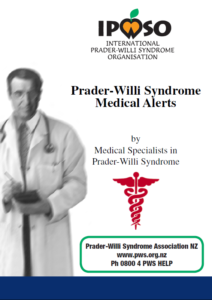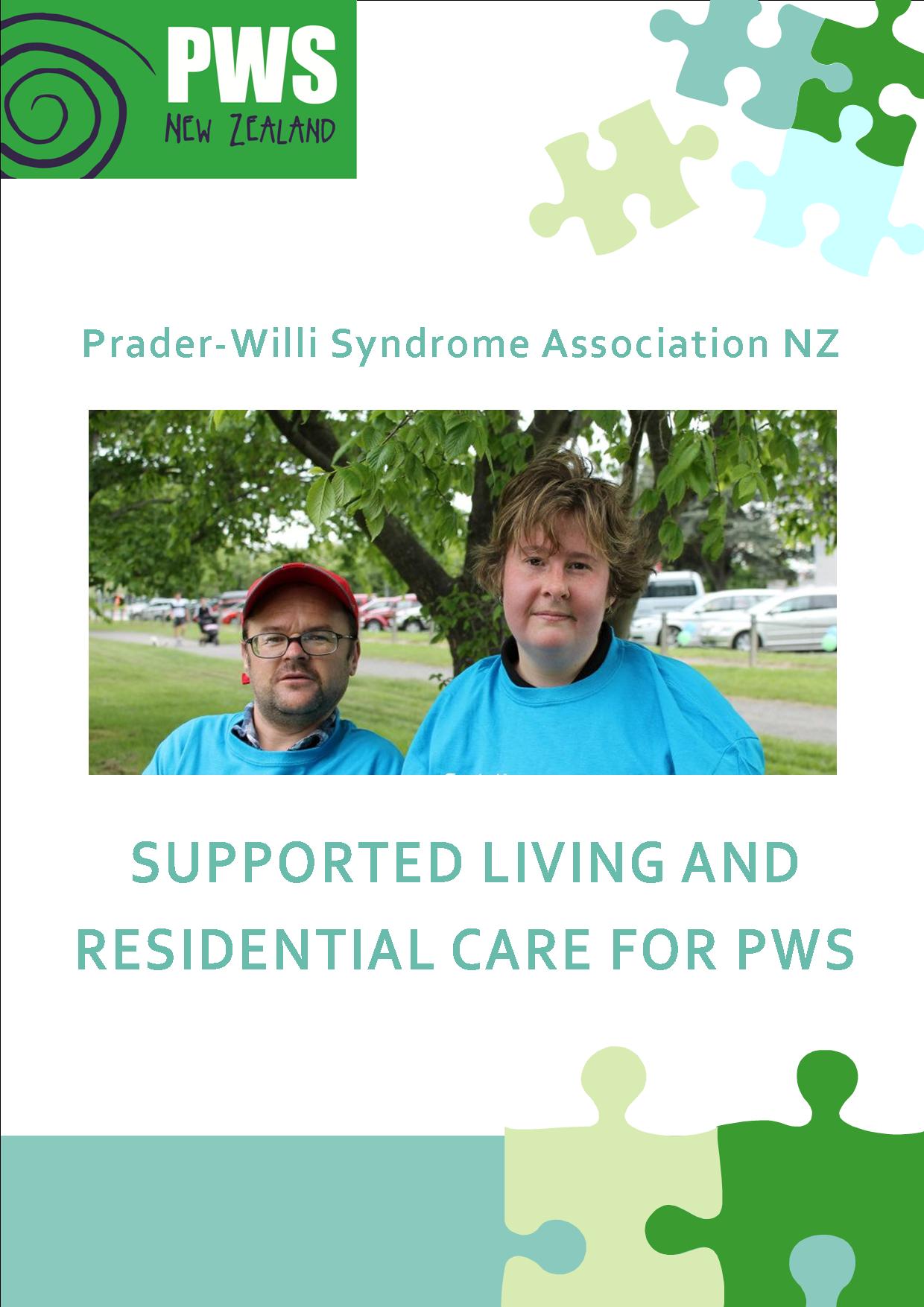Residential & Community Support – INFORMATION FOR PROVIDERS
Adults with PWS need a high level of support to keep them safe. Whilst some adults with PWS may appear to be quite articulate, able and independent, this can be misleading because there are aspects of the syndrome which individuals will find very hard to manage, creating significant health and safety risks. Adults with PWS often have poor impulse control, limited coping skills and a reduced ability to self-monitor, particularly around food and at times of stress. Supporting someone with PWS is about finding the right balance between keeping them safe whilst respecting their rights and facilitating opportunity, inclusion and independence.
- Risk Factors in PWS – by PWSA(UK)
DIETARY MANAGEMENT
Ensuring adults with PWS have an appropriate diet and ‘Food Security’ are key components of supporting someone with PWS. Having a dietitian or nutritionist available to provide guidance on nutritional requirements and weight management is recommended. Residential service providers have found that adults with PWS enjoy being involved in the menu planning for the week ahead and respond well to agreements about what everyone will eat, if individual needs have to be catered for. Sticking to the menu plan is essential!
Please see our dietary management page for why dietary management is necessary, the latest information on nutrition for PWS and advice on applying the principles of food security. Exercise opportunities are also vital, not only for weight management, but also for mental wellbeing and improving body composition, which in turn, improves metabolism.
- Managing Diet and the Food Environment
- Food Security
- Kitchen Locking Systems
- Food Security Checklists – Pittsburgh Partnership
- Exercise and Physical Activity for PWS – Kirsty Reid and Peter SW Davies
- The Basics of a Healthy Adult Lifestyle – Famcare, a project of IPWSO
- Overview of Food and Behaviour Management – pamphlet by PWCF
- What’s Wrong with Food Rewards in PWS? – Drs Forster and Gourash, 2015
TRAINING IS AVAILABLE
The PWSA(NZ) offers one day training courses for service providers – if your organisation would like some training, please visit our training courses page to check for any upcoming courses or to submit a training request. We recommend that all staff supporting individuals with PWS receive some PWS specific training.

INFORMATION PACK – COMING SOON!
HEALTH CARE
It is important that adults with PWS be under the care of a GP who has a good understanding of PWS. However, as PWS is a rare disorder, the Medical Alerts booklet and some of the other resources listed below are useful for taking with you to the GP or emergency department when there are concerns. Medical professionals and support workers can also refer to our A&E Resources page which summarises the key medical alerts to be aware of in PWS. Other health concerns and medical issues are outlined in the Medical A-Z.
The risk management plans and emergency plans that service providers will have in place should identify and take into account all the health risks and potential health complications that can occur in PWS. They should highlight the need for urgent medical evaluation in the case of vomiting, loss of appetite, abdominal pain, abdominal bloating or distention, or if an episode of binge eating is suspected. These plans should also emphasise that mild pain or signs of general unwellness may indicate more serious illness, infection or a broken limb, and should be thoroughly assessed. This is because illness can be hard to detect in PWS due to abnormalities in temperature regulation, pain threshold and a lack of vomiting. (Although adults with PWS are usually not immune compromised, a free, annual flu vaccination is recommended due to these difficulties in detecting illness and reduced respiratory strength.)
Some adults with PWS will be on prescribed medications. These may be for diabetes, mental health, sleep problems or for other reasons. Service providers should ensure that their medication records and review policies include a note for medical professionals and support workers that extra care should be taken with dose and medication combinations in PWS. Also, keep records and inform doctors of any supplements taken, as well as medications.
Support workers should also be aware of the increased risk for diabetes in some people with PWS. Whilst this risk increases with weight gain, it is also thought to be due to an altered glucose metabolism in PWS. Prevention measures include weight control and avoiding foods which are sweet or have a high glycaemic load. We recommend service providers encourage regular weight checks because weight gain occurs rapidly and is difficult to lose. Regular health checks with a GP are also a good idea for monitoring diabetes risk and for other checks, such as mental health.
This booklet is freely available to all our members and may be presented to medical professionals at A&E.
Click here to order.

- PWS Safety Poster (for health care professionals and residential homes) – by Gretton Homes, UK
- Evaluation of GI complaints chart – by IPWSO and PWSA(USA)
- PWS – Information for Emergency Department or other Hospital Staff – by PWSA(UK)
- Medical Overview – diagnosis and reference guide for health professionals – by PWSA(USA), 2009
- PWS – Care of Adults in General Practice – Elly Sheermeyer
- PWS – Information for GPs – by PWSA(UK)
- Good Health Checklist – by Famcare, a project of IPWSO
- Health and Wellbeing – by PWSA VIC, Australia
- Aging in PWS: 40+ years – by PWSA(UK)
BEHAVIOUR MANAGEMENT
People with PWS can sometimes find it difficult to regulate their emotions. They also live with high levels of anxiety and experience stress sensitivity. Therefore, those supporting individuals with PWS are likely to encounter some challenging behaviours from time to time. In a group home environment, it is essential to establish enjoyable routines and good lines of communication. Please visit our behaviour page for advice on behaviour management and a list of extensive resources. In addition to the key resources listed there, the following resources may also be useful:
- Behaviour Management 18 – 25 years – by PWSA(UK)
- Do’s and Don’ts when living with the adult with PWS – by PWCF
- Behaviour Management 25 – 40 years – by PWSA(UK)
- Behaviour Management 40 + years – by PWSA(UK)
VOCATIONAL OPPORTUNITIES / EMPLOYMENT SUPPORT
The presence of food all around us creates difficulties for people with PWS when they are in environments outside the home. They will likely need support whilst travelling around the community and at a place of work. Adaptations and careful planning are necessary to enable individuals with PWS to access the community and participate in activities and meaningful work. It may sometimes seem easier to avoid certain environments or social situations, but care should be taken to ensure hyperphagia is not a barrier to opportunities for living a full life.
The following resources may be helpful:
- Understanding PWS – Accessing the Community – by PWSA Australia
- A practical guide to supporting people with PWS in the workplace, day program or volunteer setting – by PWSA Australia
- People with PWS and Work – Best Practice Guidelines for Employers – by PWSA(UK)
- Management of PWS in the Work Setting – brochure / pamphlet to download by PWSA(USA). We also have copies of the new version and can post one to you.
- Increase Success in the Workplace: Limit Access to Food (for employers) – by Prader-Willi California Foundation
GENERAL WELLBEING
Most individuals with PWS have grown up eating in a particular way, with consistent rules and routines around food, so they have become accustomed to their diet and are accepting of it. However, like everyone else, young adults with PWS will be seeking independence and sometimes struggle with the amount of control that is needed over their lives to keep them safe. Although dietary restriction and a controlled food environment are necessary, the relentless focus on weight management can be frustrating or upsetting. Allowing choices and a level of understanding from staff, neighbours and the community can be helpful. Support Workers should be aware that adults with PWS have an increased susceptibility for mental health problems – please see our mental health page for further information about this.
We also recommend reading our page on sexual development in PWS for information on how best to support individuals with relationships. People with PWS often present with poor social skills, and due to their need to make sense of their world and manage their anxieties, they can also appear egocentric in their interests and views, but friendships and community involvement are usually very important to people with PWS. Therefore, they may need support with preparing for social occasions and support to interpret the views, feelings and behaviour of others.
People with PWS are usually good natured, caring and nurturing of others. They can be supportive of people with other disabilities and enjoy opportunities to look after other people or animals. Activities that require these caring characteristics or leadership skills can build their self-esteem.
- Education and Social Issues for Adolescents with PWS – Professor B.J. Goff
- Social Life and Relationships: 18 – 25 years – by the PWSA(UK)
- Grief and PWS: possible reactions and how to provide support – by Janalee Heinemann, Director of Research and Medical Affairs PWSA(USA). Reprinted with permission from PWSA(USA).
GENERAL SUPPORTED LIVING / RESIDENTIAL SUPPORT RESOURCES FOR PWS:
- Best Practice Guidelines for Standard of Care in PWS – The Proceedings of the 2008 and 2009 IPWSO Caregivers’ Conferences.
- Residential Care and Supported Living 18 – 25 years – by PWSA(UK)
- Providing PWS Support in Residential Settings – by PWSA Australia
- Information for Residential Care and Supported Living Staff – by PWSA(UK)
- Important Considerations for Supported Living and PWS – by PWSA(UK) and Prof Tony Holland
- Notes from the Supported Living and Residential Care Forum meeting, July 2015 – by PWSA(UK)

